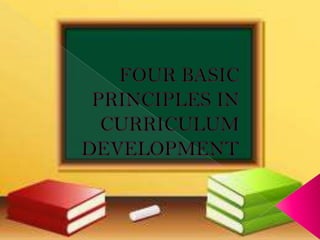Basic principles of curriculum development
•Download as PPTX, PDF•
23 likes•45,169 views
Report
Share
Report
Share

Recommended
Recommended
More Related Content
What's hot
What's hot (20)
Aims, goals and objective purpose in curriculum development

Aims, goals and objective purpose in curriculum development
Factors and forces influencing on curriculum development

Factors and forces influencing on curriculum development
Viewers also liked
Viewers also liked (8)
Principles & theories in curriculum development ppt

Principles & theories in curriculum development ppt
Fundamental principle of curriculum development and instruction

Fundamental principle of curriculum development and instruction
Similar to Basic principles of curriculum development
Nature, Concepts and Purposes of Curriculum: Teaching-Learning Processes and ...

Nature, Concepts and Purposes of Curriculum: Teaching-Learning Processes and ...Christine Faith Java
Similar to Basic principles of curriculum development (20)
Learning Process, Training Climate, Development and Designing Training Modules

Learning Process, Training Climate, Development and Designing Training Modules
Teaching learning processes and curriculum development

Teaching learning processes and curriculum development
Educational developments in the last century by Prof. M.M. Pant

Educational developments in the last century by Prof. M.M. Pant
Nature, Concepts and Purposes of Curriculum: Teaching-Learning Processes and ...

Nature, Concepts and Purposes of Curriculum: Teaching-Learning Processes and ...
Continuous assessment as a relevant tool to quality products of learners in e...

Continuous assessment as a relevant tool to quality products of learners in e...
Recently uploaded
https://app.box.com/s/7hlvjxjalkrik7fb082xx3jk7xd7liz3TỔNG ÔN TẬP THI VÀO LỚP 10 MÔN TIẾNG ANH NĂM HỌC 2023 - 2024 CÓ ĐÁP ÁN (NGỮ Â...

TỔNG ÔN TẬP THI VÀO LỚP 10 MÔN TIẾNG ANH NĂM HỌC 2023 - 2024 CÓ ĐÁP ÁN (NGỮ Â...Nguyen Thanh Tu Collection
Recently uploaded (20)
Measures of Dispersion and Variability: Range, QD, AD and SD

Measures of Dispersion and Variability: Range, QD, AD and SD
Beyond the EU: DORA and NIS 2 Directive's Global Impact

Beyond the EU: DORA and NIS 2 Directive's Global Impact
TỔNG ÔN TẬP THI VÀO LỚP 10 MÔN TIẾNG ANH NĂM HỌC 2023 - 2024 CÓ ĐÁP ÁN (NGỮ Â...

TỔNG ÔN TẬP THI VÀO LỚP 10 MÔN TIẾNG ANH NĂM HỌC 2023 - 2024 CÓ ĐÁP ÁN (NGỮ Â...
ICT Role in 21st Century Education & its Challenges.pptx

ICT Role in 21st Century Education & its Challenges.pptx
On National Teacher Day, meet the 2024-25 Kenan Fellows

On National Teacher Day, meet the 2024-25 Kenan Fellows
Measures of Central Tendency: Mean, Median and Mode

Measures of Central Tendency: Mean, Median and Mode
Energy Resources. ( B. Pharmacy, 1st Year, Sem-II) Natural Resources

Energy Resources. ( B. Pharmacy, 1st Year, Sem-II) Natural Resources
Z Score,T Score, Percential Rank and Box Plot Graph

Z Score,T Score, Percential Rank and Box Plot Graph
Unit-V; Pricing (Pharma Marketing Management).pptx

Unit-V; Pricing (Pharma Marketing Management).pptx
Basic principles of curriculum development
- 2. Purposes of the School Educational experiences related to purposes Organization of the Experiences Evaluation of Experiences
- 4. Studies of the learners themselves as a source of educational objectives Studies of contemporary life outside the school Suggestions about objectives from subject specialists The use of philosophy in selecting objectives The use of a psychology of learning and selecting objectives
- 6. Tyler pays much of attention to arguing for general principles in selecting learning experiences: The first of these is that for a given objective to be achieved, the child must have experiences that give him/her an opportunity to practice the kind of behavior implied in the objective. The second principle states that the learning experience must be such that the child obtains satisfaction from carrying on the kind of behavior implied by the objectives. The third general principle is that the reactions desired in the experience are within the range of possibility for the child involved.
- 7. The fourth principle is that there are many particular experiences that can be used to attain the same objectives. The fifth principle stresses the fact that the same learning experience will usually bring about several outcomes. Learning experiences contribute to attaining various types of objectives. They develop the child's ability to think, to acquire information, and to develop social attitudes and interests.
- 9. Tyler points out three criteria to be met in building an effectively organized group of learning experiences: The first is continuity, which refers to the vertical set of relations. This means for instance that over time the same kinds of skills will be brought into continuing operation. The second criterion is sequence, which is related to continuity. A curriculum element might recur again and again but merely at the same level. Sequence emphasizes the importance of having each experience built upon the preceding one but to go more broadly and deeply into the matters involved. The third criterion integration refers to the horizontal relationship of curriculum experiences. Integration will help the child increasingly to get a unified view and to unify his/her behavior in relation to the elements dealt with.
- 11. According to Tyler, the basic task of evaluation is to determine to what extent the objectives have been realized through the program of curriculum and instruction. His conception of evaluation contains two important aspects: First, it implies that evaluation must appraise the behavior of students because it is the change in behavior which is sought in education. Second it implies that evaluation must involve more than a single appraisal at any one time as to see if change has occurred. It is necessary to make a judgment at any early point and other judgments at later points to identify changes that may occur. As a consequence of this concept a teacher cannot evaluate an instructional program by testing a group of students only at the end of the program. Without knowing where they were at the beginning, it is not possible to tell how far changes have taken place.
